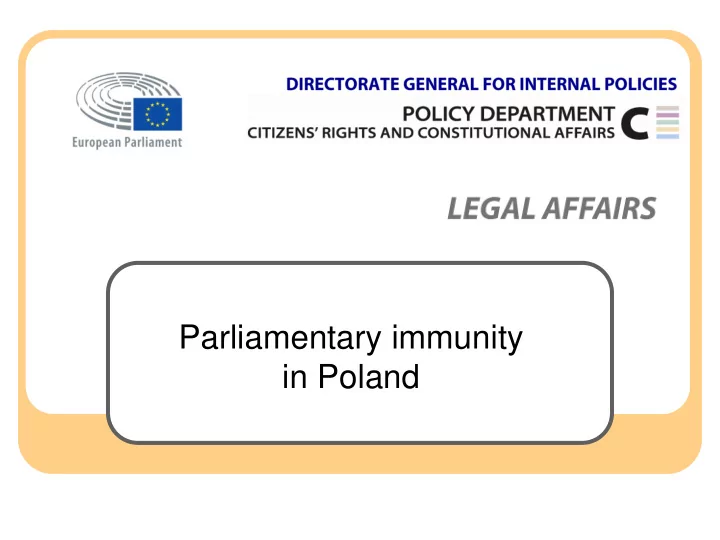

Parliamentary immunity in Poland
Contents Introduction – immunity in the context of constitutional principles Material immunity (irresponsibility) Types of inviolability privileges Immunity procedures Parliamentary practice
Introduction Article 105 of the Constitution of the Republic of Poland – four forms of parliamentary immunity Immunity seen as: • guarantee of the free parliamentary mandate, • guarantee of autonomy of parliament, • exception from the principle of equality.
Material immunity (1) Article 105 para. 1 of the Constitution Limited scope: protects only „activities performed within the scope of parliamentary mandate” Permanent – protection continued after expiry of parliamentary mandate
Material immunity (2) Accountability before the Sejm (or the Senate) Possible accountability before courts in case of „infringement of the rights of third parties”
Inviolability privileges (1) Formal immunity (Article 105 para. 2 of the Constitution) Protection from criminal accountability Ends with expiry of mandate MP may „renounce” the immunity (Article 105 para. 4 of the Constitution)
Inviolability privileges (2) Protection from detention and arrest (Article 105 para. 5 of the Constitution) Requesting suspension of criminal proceedings instituted before the day of the election (Article 105 para. 3 of the Constitution)
Immunity procedures Waiver of immunity: • Impossible in case of a material immunity, • Model procedure: formal control of the motion, committee stage, plenary stage. „Renouncing” the formal immunity: • Standard procedure, • New procedure („driving misdemeanours”). Requesting suspension of criminal proceedings
Parliamentary practice Increase of immunity cases (mostly „driving misdemeanours”) The Sejm – about 70 resolutions concerning waiving the immunity between 2003 and 2015, 1/3 with „a positive decision” (waiver) The Senate – 11 resolutions in the same period, no waivers
Presentation by Piotr CHYBALSKI, PhD Bureau of Research, Chancellery of the Sejm of the Republic of Poland Policy Department Citizens’ Rights and Constitutional Affairs Responsible Administrator: Roberta PANIZZA poldep-citizens@europarl.europa.eu
Recommend
More recommend